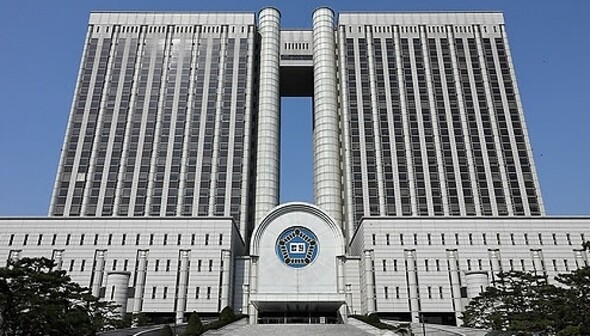hankyoreh
Links to other country sites 다른 나라 사이트 링크
On sexual morality, major changes in South Korean judiciary

South Korea’s top two judicial institutions, the Supreme Court and Constitutional Court, have been undergoing a major shift in their attitudes on issues related to marriage, family, and sexual morality.
With the Constitutional Court having previously abolished the criminalization of adultery, 2015 could mark a major change in the judiciary’s approach to family and sexual morality issues if the Supreme Court adopts the principle of no-fault divorce.
The shift from the two courts appears to show them belatedly coming around on changes in sexual views and culture among the general public. One law that made it punishable for a man to have sexual relations with a woman by misrepresenting his plans to marry her was not abolished until 2009. In its decision to abolish the crime, which was based on anachronistic notions of “chastity,” the Constitutional Court noted that “Many changes in the public’s perceptions on laws regarding marriage and sexuality have rendered minimal the need for criminal law to actively protect against premarital sexual relations resulting from errors on the woman’s part.”
In 2013, the Supreme Court acknowledged the criminality of rape within a marital relationship.
“The belief that gender equality and the right to sexual self-determination should be respected even between married couples has established itself as a widespread legal view among the public,” its ruling said.
The shift has meant less state involvement in sexual relations between consenting adults, as well as an understanding that the state can intervene for the sake of human dignity and happiness in cases of marital sexual assault, which had previously fallen outside the scope of criminal law due to patriarchal values.
The Constitutional Court’s decision in February finding the criminalization of adultery unconstitutional also resulted from major value being placed on individual pursuit of happiness and the protection of privacy.
The issue of fault-based and no-fault principles in divorce, which was the subject of open arguments in the Supreme Court on June 26, is another that pits the idea of individual pursuit of happiness and privacy freedom against arguments for institutional guarantees on family life by the state.
Experts predict that the traditional marriage system in South Korea will weaken further with a rise in common law relationships. While civil law still focuses on legal marriages, acknowledging only relationships for which an official notice has been filed, court precedents and laws on pensions have increasingly tended to protect common law spouses as well.
“Where the previous legal system did everything it could to protect the formal framework of the ‘family,’ it’s looking more like there’s going to be a focus on individual pursuit of happiness and protecting ‘de facto families’ going ahead,” said attorney Choi Yu-jeong.
By Lee Kyung-mi, staff reporter
Please direct questions or comments to [english@hani.co.kr]

Editorial・opinion
![[Column] The miscalculations that started the Korean War mustn’t be repeated [Column] The miscalculations that started the Korean War mustn’t be repeated](https://flexible.img.hani.co.kr/flexible/normal/500/300/imgdb/original/2024/0630/9717197068967684.jpg) [Column] The miscalculations that started the Korean War mustn’t be repeated
[Column] The miscalculations that started the Korean War mustn’t be repeated![[Correspondent’s column] China-Europe relations tested once more by EV war [Correspondent’s column] China-Europe relations tested once more by EV war](https://flexible.img.hani.co.kr/flexible/normal/500/300/imgdb/original/2024/0628/7617195640940814.jpg) [Correspondent’s column] China-Europe relations tested once more by EV war
[Correspondent’s column] China-Europe relations tested once more by EV war- [Correspondent’s column] Who really created the new ‘axis of evil’?
- [Editorial] Exploiting foreign domestic workers won’t solve Korea’s birth rate problem
- [Column] Kim and Putin’s new world order
- [Editorial] Workplace hazards can be prevented — why weren’t they this time?
- [Editorial] Seoul failed to use diplomacy with Moscow — now it’s resorting to threats
- [Column] Balloons, drones, wiretapping… Yongsan’s got it all!
- [Editorial] It’s time for us all to rethink our approach to North Korea
- [Column] Why empty gestures matter more than ever
Most viewed articles
- 1[Column] The miscalculations that started the Korean War mustn’t be repeated
- 2Yoon echoed conspiracy theories about Itaewon disaster, former National Assembly speaker says
- 3Dreams of a better life brought them to Korea — then a tragic fire tore them apart
- 4[Correspondent’s column] Who really created the new ‘axis of evil’?
- 5Moscow tells Seoul to rethink ‘confrontational course’
- 6[Correspondent’s column] China-Europe relations tested once more by EV war
- 7[Editorial] Seoul failed to use diplomacy with Moscow — now it’s resorting to threats
- 8Blaze at lithium battery plant in Korea leaves over 20 dead
- 9[Column] Kim and Putin’s new world order
- 10CIA record confirms US ‘completely destroyed’ Seoul’s Haebangchon in 1950 bombardment